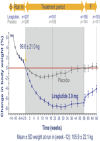Pharmacotherapy for obesity: novel agents and paradigms
- PMID: 24790728
- PMCID: PMC3992824
- DOI: 10.1177/2040622314522848
Pharmacotherapy for obesity: novel agents and paradigms
Abstract
Public health initiatives focused on obesity prevention and lifestyle intervention programmes for patients with obesity have struggled to contain the obesity epidemic to date. In recent years, antiobesity drug therapies have had a limited role in clinical treatment algorithms for patients with obesity. Indeed, a number of high-profile antiobesity drug suspensions have markedly impacted upon the landscape of obesity pharmacotherapy. In this review, we discuss the advent of an increasing array of pharmacotherapeutic agents, which are effective both in inducing weight loss and in maintaining weight loss achieved by lifestyle measures. The development of these drugs as antiobesity agents has followed varying paths, ranging from lorcaserin, a selective serotonin agent, exploiting the beneficial central actions of fenfluramine but without the associated systemic side effects, to liraglutide, a gut hormone already used as a glucose-lowering drug but with appetite-suppressant properties, or the novel drug combination of phentermine/topiramate, two 'old' drugs used in lower doses than with previous therapeutic uses, resulting in an additive effect on weight loss and fewer side effects. We summarize the key findings from recent randomized controlled trials of these three drugs. Although these agents lead to clinically important weight loss when used as monotherapy, the use of antiobesity drugs as adjunctive therapy post intensive lifestyle intervention could prove to be the most successful strategy. Moreover, a progressive approach to obesity pharmacotherapy perhaps offers the best opportunity to finally address the obesity crisis on a mass scale.
Keywords: appetite suppressant; liraglutide; lorcaserin; obesity; pharmacotherapy; phentermine; topiramate; weight loss.
Conflict of interest statement
Figures



References
-
- Anderson J., Konz E., Frederich R., Wood C. (2001) Long-term weight-loss maintenance: a meta-analysis of US studies. Am J Clin Nutr 74: 579–584 - PubMed
-
- Arterburn D., Westbrook E., Terrell A. (2013) Weight control practices of severely obese patients who are not seeking bariatric surgery. Obesity (Silver Spring) 21: 1509-1513 - PubMed
-
- Astrup A., Caterson I., Zelissen P., Guy-Grand B., Carruba M., Levy B., et al. (2004b) Topiramate: long-term maintenance of weight loss induced by a low-calorie diet in obese subjects. Obes Res 12: 1658–1669 - PubMed
Publication types
LinkOut - more resources
Full Text Sources
Other Literature Sources

